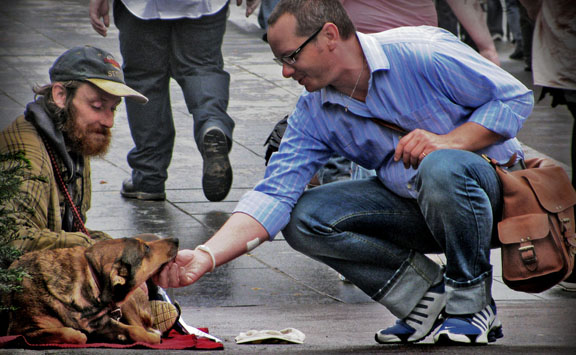Matthew 25:35-40 is one of the most commonly quoted passages related to the poor:
For I was hungry and you gave me food, I was thirsty and you gave me drink, I was a stranger and you welcomed me, I was naked and you clothed me, I was sick and you visited me, I was in prison and you came to me.” Then the righteous will answer him, saying, “Lord, when did we see you hungry and feed you, or thirsty and give you drink? And when did we see you a stranger and welcome you, or naked and clothe you? And when did we see you sick or in prison and visit you?” And the King will answer them, “Truly, I say to you, as you did it to one of the least of these my brothers, you did it to me.” (ESV)
Davis begins his discussion of the poor and of the Christian’s duty to the poor by highlighting this passage and Christ’s particular identification with the poor:
Jesus didn’t come to earth and identify with the rich, the successful, and the most influential. He entered the world as a pauper. He entered the world not in the comfort of his parents’ home, nor in the company of smiling relatives or even the safety of a hospital. He arrived in the humblest of places, in the lowliest of circumstances. God hid the mystery of the kingdom in the lives of the most needy. Is it any wonder, then, that Jesus associated himself with the “least of these”? That when we help them, we’re helping Jesus? God has tremendous love for those who are rejected, abandoned, and laughed at. (Chapter 1)
If Jesus associated himself with the “least of these,” then what should be our response? Davis argues that Christians must live out of the gospel:
C.S. Lewis wrote, “The Church just exists to help people be little Christs.” I certainly have met individuals and church families who live this out. But all too often, those of us who call ourselves Christians live in direct opposition to what Christ said we should do. Living out the gospel is hard work. It’s easy to talk about it. Any of us can sit in church and sing warm, happy worship songs that make us feel good. We can nod agreeably with the pastor’s wisdom. And sometimes we can even drop a few extra dollars into the offering basket. But it’s not so easy to actually go and do what Jesus said to do. Jesus calls us to live in ways that go against our natural inclinations. (Chapter 1)
Though living out the gospel of Jesus Christ is not always an easy task, Davis believes that true transformation takes place when Christians practice obedience in this way. He challenges his readers:
What if all Christ-followers lived the Red Letter words in the Bible—Jesus’ words? What if we offered the hungry something to eat, gave one of our many coats to someone who was cold, and truly loved all our neighbors as ourselves? How radically different would our lives be? How different would our world be if Christians were really living as little Christs? (Chapter 1)








